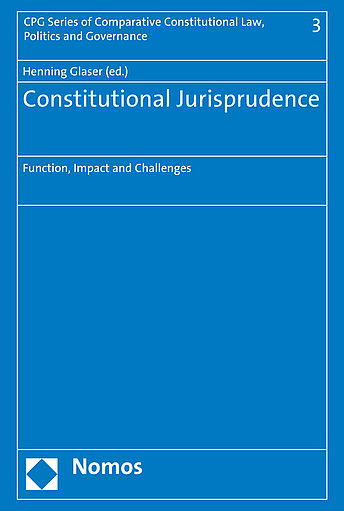englischAfter the Continental-European type of specialised constitutional courts has globally largely prevailed over the past two decades (at least beyond the Anglo-Saxon world), constitutional courts increasingly decided questions with far-reaching political consequences in various political settings. In this respect, a general tendency towards the judicialization of politics is embodied particularly clearly in the institution of constitutional courts. Correspondingly, role and performance of constitutional courts are increasingly challenged in political debate in a range of political settings and became one of the most interesting topics in recent academic discourses on constitutional theory. Despite their common roots in a few models these courts vary widely in their role within the constitutional system, their functions and their effective performance. Against this background the contributions collected in this volume address – among others – questions such as the constitutionalization of the legal system and the increasing politicalization of constitutional courts. The contributions refer to the constitutional systems of Cambodia, Croatia, Germany Indonesia, Japan, Pakistan, Poland, Spain, South Korea, Thailand and Vietnam. Practice-oriented perspectives are provided by the contributions of incumbent or former constitutional court justices among the authors (from Cambodia, Croatia, and Poland).
Contributors:
Slavica Banic (Richterin, Verfassungsgericht, Kroatien), Byung-Song Cho (Öffentliches Recht, Cheongju Univ., Südkorea), Jong-ik Chon (Öffentliches Recht, Seoul National Univ., Südkorea), Ingwer Ebsen (Öffentliches Recht, Univ. Frankfurt a.M., Deutschland), Robert Esser (Deutsches, Europäisches und Internationales Strafrecht, Univ. Passau, Deutschland), Yasuo Hasebe (Öffentliches Recht, Tokyo Univ., Japan), Matthias Jestaedt (Öffentliches Recht, Univ. Freiburg, Deutschland), Bartosz Makowicz (Öffentliches Recht, Europa Univ. Viadrina, Deutschland), Van Quang Nguyen (Öffentliches Recht, Hanoi Law University, Vietnam), Javier Garcia Roca (Öffentliches Recht, Complutense Univ. Madrid, Spanien), Osama Siddique (Verfassungsrecht, Lahore Univ. of Management Sciences, Pakistan), Son Soubert (Privy Councillor to His Majesty the King of Cambodia, Kambodscha), Heru Susetyo (Öffentliches Recht, Univ. Indonesia, Indonesien), Miroslaw Wyrzykowski (Öffentliches Recht, Univ. Warschau, Polen), Jiunn-rong Yeh (Öffentliches Recht, National Taiwan Univ., Taiwan)
Nachdem sich die spezialisierte Verfassungsgerichtsbarkeit nach kontinentaleuropäischem Vorbild in den letzten zwei Jahrzehnten außerhalb des angelsächsischen Rechtskreises global weitgehend durchgesetzt hat, haben Verfassungsgerichte in den unterschiedlichsten Verfassungsordnungen zunehmend Fragen mit weit reichenden politischen Konsequenzen entschieden. Insofern kommt in der Institution Verfassungsgerichtsbarkeit die allgemeine Tendenz einer zunehmenden Verrechtlichung der Politik besonders deutlich zum Tragen. Damit ist die Rolle und Performanz von Verfassungsgerichten in der praktischen Debatte zum Teil heftigen Herausforderungen ausgesetzt und im akademischen Diskurs zu einem der interessantesten Themenfelder der letzten Jahre geworden. Trotz der gemeinsamen Wurzel unterscheiden sich die einzelnen Verfassungsgerichte teilweise erheblich hinsichtlich ihrer Rolle im Verfassungsgefüge, den ihnen durch die Verfassung zugemessenen Aufgaben, so wie praktisch ihrem tatsächlichen Einfluss und ihrer Performanz. Im Rahmen dieser Aspekte widmen sich die im vorliegenden Band versammelten Beiträge unter anderem Fragen wie der Konstitutionalisierung der Rechtsordnung durch die Verfassungsgerichtsbarkeit und ihrer wachsenden Politisierung. Die Beiträge beziehen sich auf die Verfassungsrechtsordnungen in Deutschland, Kambodscha, Kroatien, Indonesien, Japan, Pakistan, Polen, Spanien, Südkorea, Taiwan und Vietnam. Unter ihnen sind auch drei Beiträge, die das Phänomen aus der praktischen Perspektive von amtierenden bzw. ehemaligen Verfassungsrichtern beleuchten.
Mit Beiträgen von:
Slavica Banic (Richterin, Verfassungsgericht, Kroatien), Byung-Song Cho (Öffentliches Recht, Cheongju Univ., Südkorea), Jong-ik Chon (Öffentliches Recht, Seoul National Univ., Südkorea), Ingwer Ebsen (Öffentliches Recht, Univ. Frankfurt a.M., Deutschland), Robert Esser (Deutsches, Europäisches und Internationales Strafrecht, Univ. Passau, Deutschland), Yasuo Hasebe (Öffentliches Recht, Tokyo Univ., Japan), Matthias Jestaedt (Öffentliches Recht, Univ. Freiburg, Deutschland), Bartosz Makowicz (Öffentliches Recht, Europa Univ. Viadrina, Deutschland), Van Quang Nguyen (Öffentliches Recht, Hanoi Law University, Vietnam), Javier Garcia Roca (Öffentliches Recht, Complutense Univ. Madrid, Spanien), Osama Siddique (Verfassungsrecht, Lahore Univ. of Management Sciences, Pakistan), Son Soubert (Privy Councillor to His Majesty the King of Cambodia, Kambodscha), Heru Susetyo (Öffentliches Recht, Univ. Indonesia, Indonesien), Miroslaw Wyrzykowski (Öffentliches Recht, Univ. Warschau, Polen), Jiunn-rong Yeh (Öffentliches Recht, National Taiwan Univ., Taiwan)



